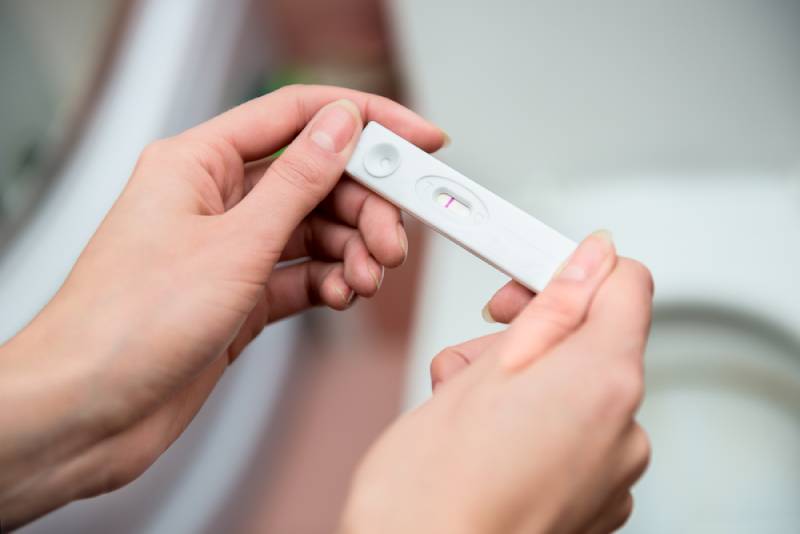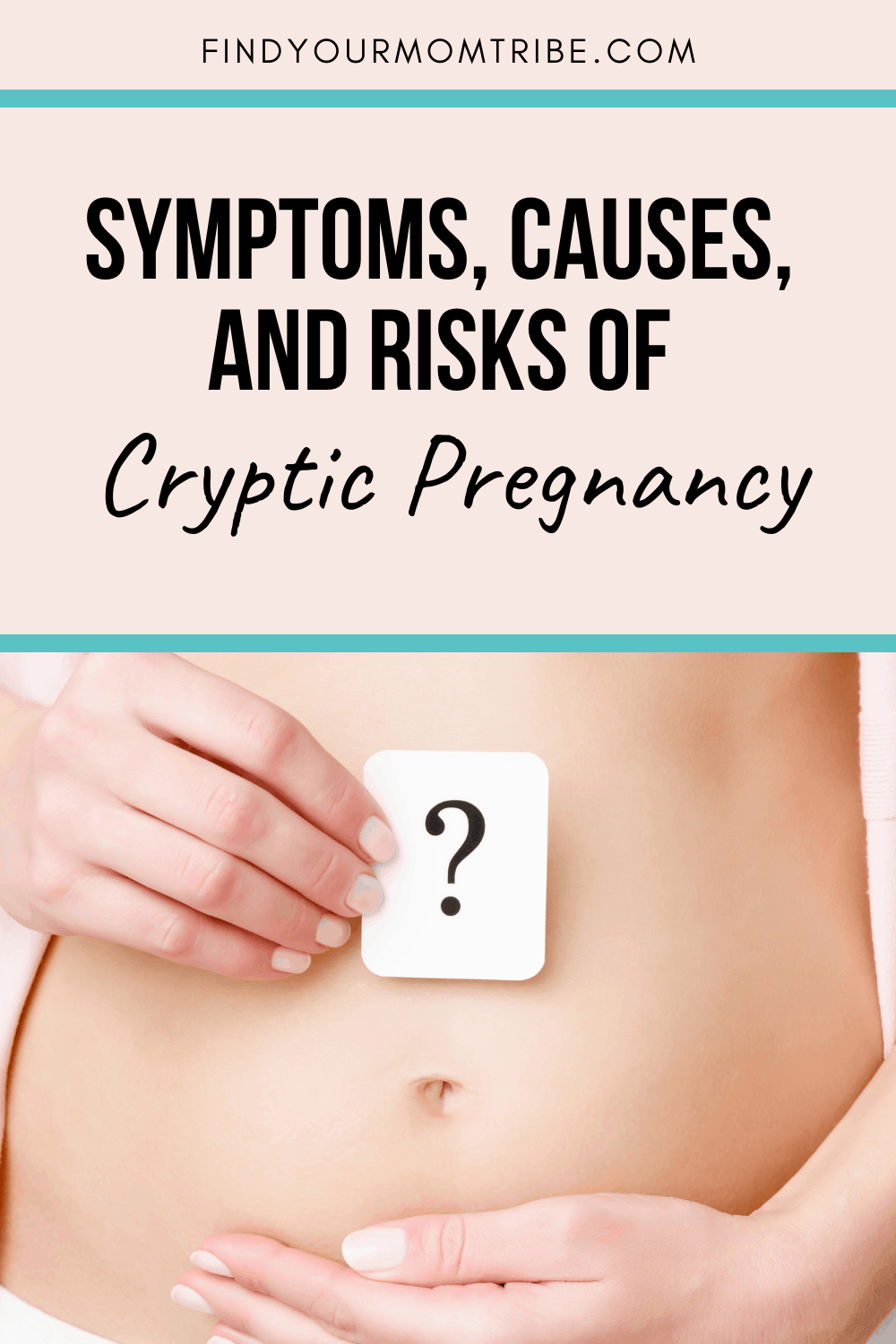If you’ve ever watched an episode of I Didn’t Know I Was Pregnant, then you already know the definition of cryptic pregnancy.
Also known as stealth or denied pregnancy, this phenomenon is when a woman is pregnant without realizing it late into the pregnancy, and sometimes up until the very moment of childbirth.
Obviously, the thought of suddenly giving birth to a baby you had no idea existed until a few hours ago is enough to send any woman into a flat panic, wondering frantically what the symptoms of this unusual phenomenon are.
The trouble is that the lack of symptoms is a symptom of an undetected pregnancy.
While women usually experience morning sickness, weight gain, and mood swings (on top of a growing belly), ladies who don’t know they are pregnant miss many of these symptoms.
However, there are certain factors that put you at a higher risk of being pregnant without realizing it, such as low body fat or having given birth recently – so, read on to get all the information you need.
What Is A Cryptic Pregnancy?

To any woman who’s been pregnant and given birth, the concept of a cryptic pregnancy can sound simply unbelievable.
Not only does an expectant mother gain weight and go through a slew of physical changes before giving birth, but she can also feel her baby moving inside her belly – a pretty unmistakable sign of pregnancy.
Cryptic pregnancy, as the name suggests, is a phenomenon where a woman doesn’t know she’s pregnant until late into the gestation period or until childbirth starts.
Stealth pregnancy has been the topic of numerous newspaper stories and the famous documentary series I Didn’t Know I Was Pregnant.
But how many women actually experience a cryptic pregnancy? According to Stammers and Long, around 1 in 475 births is as a result of stealth pregnancy.
The Symptoms

It’s difficult to narrow down the symptoms of a cryptic pregnancy precisely because it’s characterized by a lack of symptoms of pregnancy.
Most pregnant women find out about their pregnancy early in the first trimester after missing their period and taking a home pregnancy test.
Then, they visit their OB/GYN who usually performs a series of tests, including as a blood test, to confirm the home pregnancy test results.
Women who don’t know they’re pregnant, however, usually experience the following cryptic pregnancy symptoms:
- false negative pregnancy test;
- no morning sickness;
- no weight gain (or they don’t notice the weight gain);
- lack of abdominal swelling;
Disregard of other signs of pregnancy (such as fetal movement) or not recognizing them as such.
Usually, a missed period sets off alarms in a woman’s head, especially if she has regular menstrual cycles.
However, it’s not uncommon for women to have irregular periods. As a result, they don’t take note of a missed period and fail to see it as anything unusual.
If they take birth control pills, they might be used to having short or sporadic periods. Plus, using any form of birth control can convince a woman there is no chance she could be pregnant.
On the other hand, some women report having their periods regularly throughout the duration of their hidden pregnancy, leading them to believe that nothing is out of the ordinary.
The sensation of the baby moving can be dismissed as indigestion, gas, or other stomach problems.
Some mothers may have trouble understanding how a woman with a denied pregnancy couldn’t notice the movement of the baby, considering that a little one’s movements and kicks in utero can even be uncomfortable.
To explain this phenomenon, the Royal College of Obstetricians and Gynaecologists points to the position of the placenta. If the placenta is positioned at the front of the uterus, it can be more difficult to feel the baby kick and move.
Likewise, Marc Del Giudice claims that babies who are born from denied pregnancies tend to be underweight. This can account for the fact that women don’t notice growth in their abdominal region until late into the gestation period or even until they go into labor.
In the absence of other typical pregnancy symptoms, it’s easy for a woman to attribute pregnancy signs such as mood swings to stress or other changes in her life.
This is especially common among those who haven’t experienced pregnancy before and don’t know how to recognize the signs.
How can a pregnancy test be a false negative?
Even though the results of a pregnancy test can be false, they are generally accurate for the majority of women.
A home pregnancy test works by detecting the amount of the hormone human chorionic gonadotropin (hCG) in the urine, producing either a positive or a negative result.
However, it’s possible for the urine test to be falsely negative, leading the woman to believe she’s not pregnant.
There are different reasons why a pregnancy test might be falsely negative, including:
- not following the instructions correctly;
- taking the test too soon;
- drinking too much water prior to taking the test;
- taking certain medications.
When a urine test is repeatedly negative but you still feel like something is off and you could be pregnant, it’s best to visit your doctor and do a blood test. They can also do an ultrasound to confirm whether or not you’re pregnant.
However, ultrasounds in early pregnancy can also produce false negative results in case there are any irregularities, such as a tilted uterus (also known as uterine retroversion) that make it difficult to detect the baby.
Look for a second opinion if needed and don’t be afraid to discuss your concerns openly with your healthcare provider.
Who Is At Risk Of A Cryptic Pregnancy

With the exception of abstinence, there is no birth control method that can provide you with a 100 percent guarantee that you will not get pregnant.
That being said, there are certain groups of women whose chances are higher when it comes to experiencing a stealth pregnancy.
These include woman who:
- are seriously overweight;
- recently had a baby;
- play sports or work out a lot;
- have a very low body fat;
- are in perimenopause;
- struggle with infertility;
- are diagnosed with polycystic ovarian syndrome (PCOS).
A baby bump is a telltale sign of pregnancy. However, a woman’s body shape can play an important role in how she carries.
For women who are overweight, they might not notice the change, although even women who are athletic and play sports can fail to notice the growth of their belly since they have very strong stomach muscles.
Women who have low body fat often also experience irregular cycles, which puts them at risk of not knowing they have conceived.
If a woman recently gave birth, she might also chalk up any pregnancy symptoms to postpartum changes, especially when you factor in the connection between breastfeeding and periods.
Not to mention that it’s not unusual to have irregular periods after having a baby, so a new mom might not even think that she should take a pregnancy test.
Women with fluctuations in hormone levels, especially those who are diagnosed with PCOS, may also be unaware that they are pregnant.
It causes hormonal imbalances and makes the menstrual cycles irregular to the point where a woman might not get a period for months, making it easy to forget about the potential of pregnancy.
Struggling with infertility can also lead to denial of pregnancy.
When a woman enters the perimenopause stage, it can be difficult to discern whether the symptoms she’s having are due to pregnancy or because she’s entering menopause. Irregular periods and mood swings, for example, are common among perimenopausal women.
It’s important to note that giving birth, being athletic, having PCOS, or experiencing very irregular periods can also have an impact on your hCG levels and produce a negative pregnancy test.
Possible Risks For Mom And Baby

First off, I’d like to point out that it’s absolutely possible for a woman to give birth after not knowing she was pregnant and deliver a happy and healthy baby. However, there are many risks for both the baby and mother, especially if the entire pregnancy goes undetected.
Here is a brief overview:
- lack of prenatal care causing potential health problems for the baby;
- lack of practical and emotional preparation for the baby;
- preterm birth;
- low birth weight;
- giving birth without a medical professional present.
The first concern is the lack of prenatal care. Under normal circumstances, women who have conceived make lifestyle changes to make sure their baby can develop well and not have any health problems.
Quitting drinking and smoking are at the top of the list, in addition to eating well and taking prenatal vitamins.
Then there is the practical aspect of preparing for a baby. There are so many baby things to buy before birth that not only cost a pretty penny but take time to install and set up in the home.
Unless this is not the couple’s first baby, it’s highly unlikely they have a nursery, a crib, or any other essentials for an infant child.
Having a baby unexpectedly also poses complications for the mother’s employment and whether there are enough resources to provide for the baby boy or girl.
Emotionally speaking, this can be an incredible shock, especially if the mother doesn’t have a strong support system and the father of the baby isn’t present in the picture, or the couple had no plans to become parents anytime soon.
As for the baby, there are numerous health risks. A baby girl or boy born from a stealth pregnancy can be underweight, as mentioned above.
In addition, unhealthy lifestyle choices like smoking can increase the chances of premature birth and even sudden infant death syndrome (SIDS).
Heavy drinking can impair the baby’s brain development, so there are a number of serious health problems these babies may face.
Because a woman with a cryptic pregnancy might not realize she’s carrying a baby until the very last moment, there’s a high probability she’ll give birth without a medical professional present, which increases the chances of infection.
Plus, any complications during birth could become dangerous unless a medical team is there to help.
Mental Illness And Cryptic Pregnancy

There is a difference between women who don’t know they are pregnant due to the absence of symptoms or failing to recognize certain symptoms as being a sign of pregnancy, and women who deny or ignore their pregnancy due to mental illness.
Jenkins, Millar, and Robins states that women who suffer from bipolar disorder or schizophrenia, for example, might believe their signs of pregnancy are a result of causes that are delusional.
In other words, what an outside person would interpret as a pregnancy symptom, the woman in question would chalk up to a cause that has no basis in reality.
It’s also possible for the woman to shift between accepting and denying her pregnancy.
However, women without a history of mental illness are likely to not realize they are pregnant due to physical rather than emotional reasons, and it’s important to make a distinction between the two.
Final Thoughts
The very notion of cryptic pregnancy is terrifying to a lot of women. After all, babies require plenty of preparation (both financial and emotional) before their arrival.
A couple who is wholly unprepared for parenthood might find themselves facing some very difficult decisions if they find themselves in this situation.
Even though the lack of symptoms can be disconcerting and Googling for cryptic pregnancy pictures rarely helps, it’s important to know there are certain factors that can put you in a category with higher risks of being pregnant without knowing it, such as having PCOS or entering perimenopause.
Don’t be afraid to consult with a doctor if you feel different than usual – and don’t ignore those regular checkups, either!
References:
- “Not your average birth: considering the possibility of denied or concealed pregnancy” by Kathryn Stammers and Nicola Long. Published in BMJ Case Reports in 2014.
- “Your baby’s movements in pregnancy” by the Royal College of Obstetricians & Gynaecologists. Published on the Royal College of Obstetricians and Gynaecologists website in February 2019.
- “The evolutionary biology of cryptic pregnancy: A re-appraisal of the ‘denied pregnancy’ phenomenon” by Marco Del Giudice. Published in 2007 in Medical Hypotheses.
- “Denial of pregnancy – a literature review and discussion of ethical and legal issues” by Angela Jenkins, Simon Millar, and James Robins. Published in the Journal of the Royal Society of Medicine in 2011.
READ NEXT: 11 Early And Presumptive Signs Of Pregnancy
Like this post? Please share or pin it for later. You can also stay in the loop and follow us on Facebook, Instagram or Pinterest.

This post contains affiliate links. Please see our full disclosure for more info.

